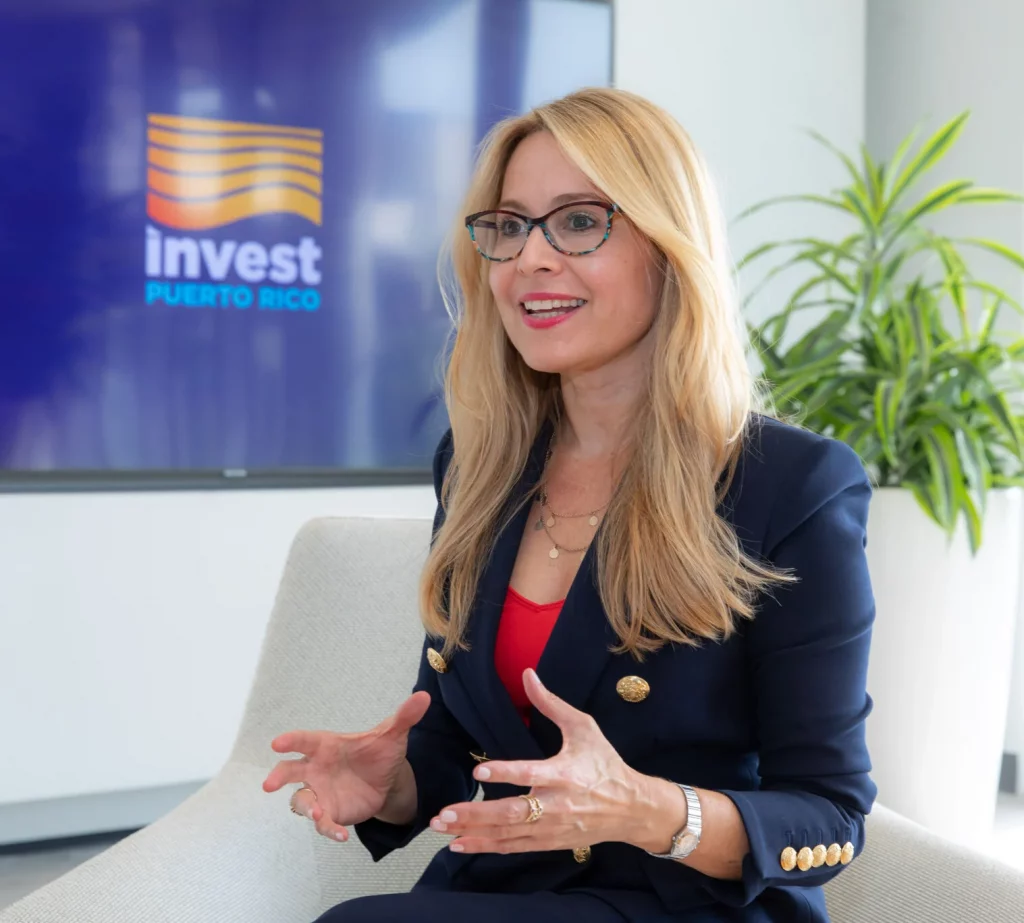
Originally published in El Vocero on February 14, 2023, and written by Stephanie López.
Since 2020, InvestPR has promoted reshoring—the practice of bringing the production and manufacturing of goods back to the US from abroad—as an opportunity to establish more manufacturing companies in Puerto Rico.
Although Ella Woger-Nieves, the CEO of InvestPR, could not name the companies that are considering locating in Puerto Rico due to confidentiality clauses, she indicated that they are currently working with ten prospects within the biosciences, aerospace, and technology sectors in their process of setting up operations on the island.
“At the end of the day, there is an opportunity to capture reshoring; these are processes that take a lot of time and effort, and it requires a lot of collaboration. We are committed to working with the public and private sectors, academia, and trade unions so that together we can pool and maximize our efforts,” the CEO noted.
Woger mentioned that the case for reshoring has gained greater interest due to geopolitical situations, particularly since the beginning of the pandemic, the conflict between the United States and China, and also the war between Russia and Ukraine. She noted that these events have triggered a global reshuffling that has increased interest in the repatriation of strategic assets.
Regarding the main challenges Puerto Rico faces in inserting itself into that strategy, the CEO recognized the issue of energy as one of the main factors.
This challenge is exacerbated with the most recent version of the Puerto Rico Electric Power Authority’s (PREPA) Debt Adjustment Plan, in which the Fiscal Control Board proposed adding a connection fee of $1,800 per month for large companies, proportional to the current rate.
“We recognize that the issue of energy infrastructure is a challenge; however, it does not necessarily have to be a barrier to doing business in Puerto Rico,” said Woger-Nieves. “But, never before has Puerto Rico had access to so many federal funds to fix the electric energy infrastructure. Those arrangements aren’t going to happen overnight, but it’s certainly something that we communicate when we talk to prospects,” she added.
On the other hand, she highlighted the Island’s objectives of reaching 100% renewable energy sources by 2050.
“When we’re talking to prospects and companies in this type of industry, what we do immediately is match the energy needs of that operation with renewable energy solutions,” she explained.
Regarding Puerto Rico’s level of competitiveness compared to other Latin American countries, where companies may choose to undertake nearshoring efforts —transferring a commercial operation to a nearby country— Woger acknowledged that operating costs are not necessarily competitive. Still, she understands that being a US territory is a great advantage for the Island.
“The fact that we are a U.S. territory means that Made in Puerto Rico is equivalent to Made in the USA. That is extremely important for these efforts because it is presented with the same regulatory and legal framework, intellectual property protection, and everything that comes with being a US territory. It’s an advantage,” she said.
Even though the manufacturing industry in Puerto Rico does not compare to the boom it had in the 1980s and 1990s, Woger indicated that “employment in the manufacturing sector on the Island is currently at its highest level in the past 10 years.” She explained that, while the labor force does not reach the same numbers as before, unemployment is at a historically low percentage and that to increase the reshoring footprint on the Island, efforts should be directed at employee retention.
She stressed that human capital in Puerto Rico is one of the strongest competitive advantages, particularly in the bioscience and aerospace areas. “They (other countries) have labor costs that are really much lower than in Puerto Rico, but the value proposition really rests on the fact that the advanced manufacturing of these types of products requires highly technical and highly trained talent, with a lot of technical experience. The Island’s value proposition is not the same as the value proposition of other countries,” she added.
The organization anticipates significant growth in the areas of life sciences, aerospace, and technology.
According to InvestPR, Puerto Rico’s biosciences sector is the number one manufacturing center in the United States; a destination where eight of the 15 best-selling pharmaceutical products in the world are manufactured.
Currently, in Puerto Rico, there is a 75% participation of manufacturers of FDA Class III devices —considered the highest risk and can serve as life support— and 30 medical device companies operate on the Island.
Regarding the aerospace technology sector, she indicated that there is an opportunity for growth since the technology manufactured for the defense industry must, for security reasons, be manufactured on US soil. “It is essential to undertake these activities in the United States for commercial security reasons and to ensure that the protections include the intellectual property of security considerations,” said the executive.
Other advantages identified are the incentives provided under Act 60 and the low cost per square foot of Class A office space compared to US cities.



